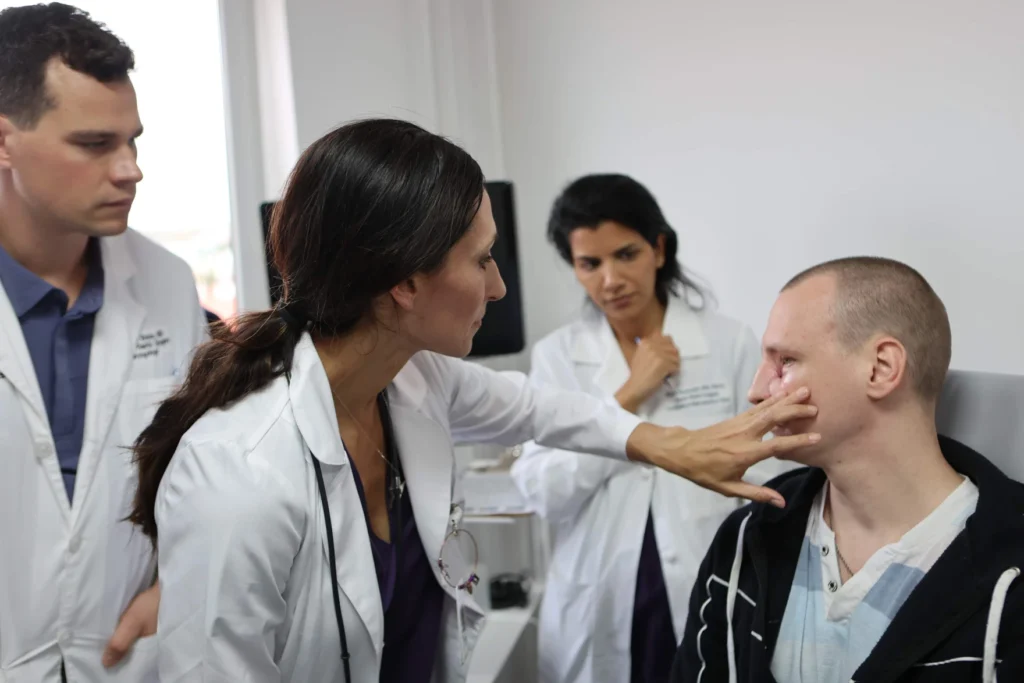Dr. Nataliya Biskup with Hutchinson Clinic, Changing Lives on Ukraine’s Front Lines
Ukrainian-American plastic surgeon Nataliya Biskup was seeking ways to help those individuals affected by the ongoing war in Ukraine. Dr. Biskup returned from her second trip to Ukraine in February to help with reconstructive surgical efforts. During her visits, she faced some of the most challenging surgeries of her career. However, the toughest part of these trips to Ukraine was witnessing the physical toll of the war on injured soldiers. “Actually seeing the physical repercussions of the war was very, very hard,” Biskup said. “It made the trip very emotional.” Originating from Lviv, Ukraine, Biskup immigrated to the U.S. as a child and currently practices as a plastic and reconstructive surgeon at The Hutchinson Clinic.
When conflict arose in Ukraine in 2014, she felt compelled to utilize her medical skills to aid her homeland, a sentiment that intensified with the 2022 Russian invasion. “You always feel very helpless. You’re just one person in the face of this huge, cataclysmic event,” she said. “It really motivated me to want to go help.” Feeling the enormity of the situation, she joined the Canadian organization Face the Future for their medical mission to Ukraine. The journey took Biskup and her team from Wichita to Warsaw, Poland, and finally to Ivano-Frankivsk, Ukraine, a trip that was prolonged due to delays at the border. Once at the local hospital, Biskup and a team of surgeons conducted an educational symposium for Ukrainian counterparts on treating severe war injuries to the head and neck before proceeding to operate on over 30 patients in four days. The surgeries addressed a range of complex injuries, including blast injuries resulting in missing facial bones, noses, and lips. The soldiers arrived from different parts of Ukraine. Many had their wounds stabilized on the frontlines of the war but needed more specialized treatment. In some cases, wounds had healed incorrectly, leading to further complications in their care. Biskup described the work as one of the most technically challenging and rewarding experiences in her career, pushing her to innovate and excel as a surgeon.
One of Biskup’s patients, Andrii Smolenskyi, was a young lawyer who volunteered to join the military and lost his vision and both arms in a major explosion while fighting on the front lines last spring. Although the surgeons couldn’t restore what he had lost, they managed to reduce some of the scarrings on his face and fit him with ocular prostheses. Biskup found his story deeply moving, emphasizing her commitment as a physician to saving and improving lives. “It affected me very deeply,” Biskup said. “As a physician, my whole goal is to save life, make life better. It’s hard to see people do that to each other.” Reflecting on the resilience and strength displayed by her patients, Biskup was struck by their toughness and perseverance in the face of life-altering injuries. She considered their resilience a true testament to the triumph of the human spirit.

While the surgical procedures were primarily focused on restoring essential functions, many patients faced challenges related to breathing and other vital activities. Biskup highlighted the dual purpose of reconstructive surgery, emphasizing that the cosmetic benefits could significantly enhance an individual’s quality of life. She emphasized the importance of appearance in boosting self-esteem and functionality, particularly for those who have endured the trauma of war and its aftermath. “These guys have risked their lives. They’ve been separated from their families. And now they carry this terrible scar,” she said. “Appearance, in and of itself, has tremendous repercussions for self-esteem and functioning — so that, on top of the war and the PTSD and all the trauma they’ve experienced, that at least they can function normally in society.” Biskup’s extended family in Ukraine has managed to stay safe, despite some close calls. She shared a recent incident where her aunt narrowly escaped harm when a Russian missile destroyed a museum located across the street from her home.
Biskup returned to Ukraine in February to perform pediatric reconstructive work on children with cleft lip and craniofacial anomalies. Meanwhile, U.S. military aid to Ukraine is drying up. President Joe Biden recently urged Congress to approve more support, but it’s unclear when, or if, it will. Biskup worries it’s emblematic of a growing sense of fatigue among Americans with the war, despite its impact on the Ukrainian people. “I think their biggest concern is being forgotten,” she said. “My biggest hope is that people continue to remember Ukraine — and continue to show up for people that need help.”

